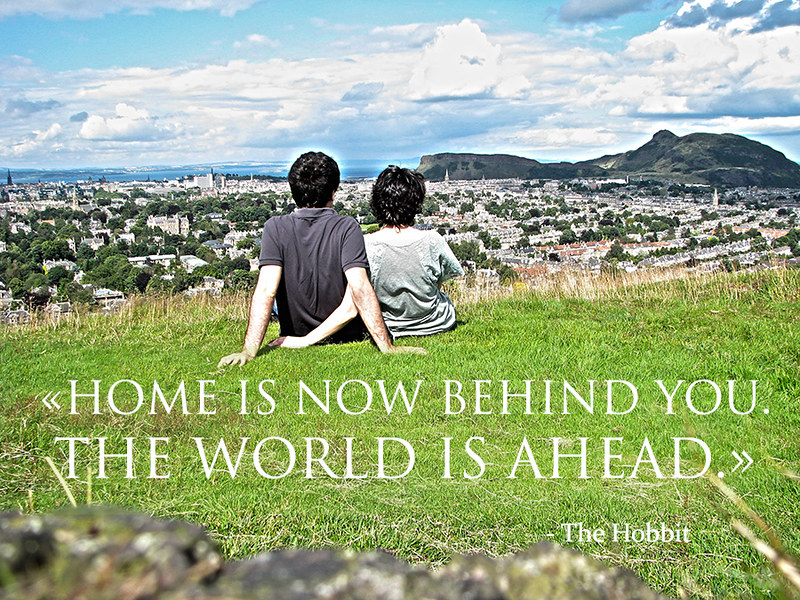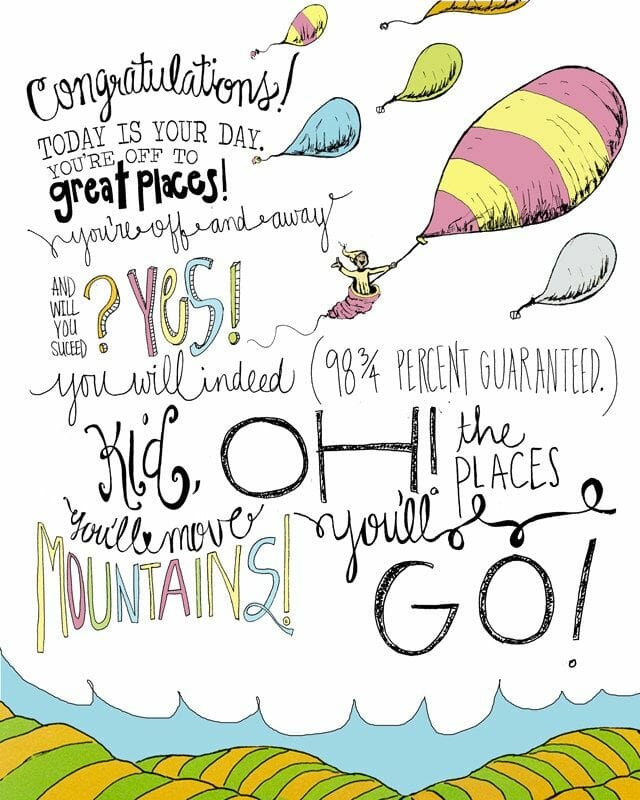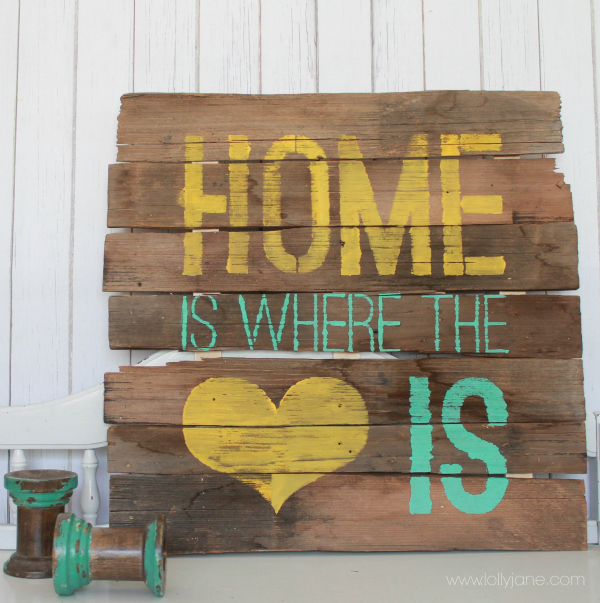I originally wrote and published this article in Spanish.
As we brace ourselves to move abroad for the third time in a few years, I look back and I know that squeezing our lives into a suitcase and leaving our native Barcelona was the best decision that we could have possibly made. Because when you move away, when you turn your life into a journey filled with uncertainty, you grow up in unexpected ways.

You face new challenges, you get to know parts of you you didn’t know existed, you’re amazed at yourself and at the world. You learn, you broaden your horizons. You unlearn, and after coming down and embracing a few lessons, you start growing in humility. You evolve. You feel homesick… and you shape memories that will stay with you forever. If you’ve ever lived away from home or embarked on a long journey, I’m sure you too have felt these 17 things that change forever when you live abroad.
1. Adrenalin becomes part of your life.
From the moment you decide to move abroad, your life turns into a powerful mix of emotions – learning, improvising, dealing with the unexpected… All your senses sharpen up, and for a while the word “routine” is dismissed from your vocabulary to make space for an ever rising adrenalin thrill ride. New places, new habits, new challenges, new people. Starting anew should terrify you, but it’s unusually addictive.
2. But when you go back… everything looks the same.
That’s why, when you get a few days off and fly back home, it strikes you how little everything has changed. Your life’s been changing at a non-stop pace, and you’re on holidays and ready to share all those anecdotes you’ve been piling up. But, at home, life’s the same as ever. Everyone keeps struggling with their daily chores, and it suddenly strikes you: life won’t stop for you.
3. You lack the (and yet you have too many) words.
When someone asks you about your new life, you lack the right words to convey all you’re experiencing. Yet later, in the middle of a random conversation, something reminds you about ‘that time when’…, and you have to hold your tongue because you don’t want to overwhelm everyone with stories from your ‘other country’ and come across as pretentious.

4. You come to understand that courage is overrated.
Lots of people will tell you how brave you are – they too would move abroad if they weren’t so scared. And you, even though you’ve been scared, too, know that courage makes up about 10% of life-changing decisions. The other 90% is purely about wanting it with all your heart. Do you want to do it, do you really feel like doing it? Then do it. From the moment we decide to jump, we’re no longer cowards nor courageous – whatever comes our way, we deal with it.
«It’s a dangerous business, Frodo, going out your door. You step onto the road, and if you don’t keep your feet, there’s no knowing where you might be swept off to.»
5. And, suddenly, you’re free.
You’ve always been free, but freedom feels different now. Now that you’ve given up every comfort and made it work thousands of miles away from home… you feel like you’re capable of anything!

6. You no longer speak one particular language.
Sometimes you unintentionally let a word from another language slip. Other times you can only think of a way of saying something… with that perfect word which, by the way, is in the wrong language. When you interact with a foreign language on a daily basis, you learn and unlearn at the same time. All the while you’re soaking up cultural references and swear words in your second language, you find yourself reading in your mother tongue so it won’t get rusty. Like that time when Homer took a home winemaking course and forgot how to drive.
7. You learn to say goodbye… and to enjoy yourself.
You soon realize that now, most things and people in your life are just passing through, and you instinctively play down the importance of most situations. You perfect the right balance between bonding and letting go – a perpetual battle between nostalgia and pragmatism.
8. You have two of everything.
Two SIM cards (one of them packed with phone numbers from all over the world), two library cards, two bank accounts… And two types of coins, which always end up mysteriously mixing when you’re about to pay for something.
9. Normal? What’s normal?
Living abroad, like traveling, makes you realise that ‘normal’ only means socially or culturally accepted. When you plunge into a different culture and a different society, your notion of normality soon falls apart. You learn there are other ways of doing things, and after a while, you too take to that habit you never thought you’d embrace. You also get to know yourself a little better, because you discover that some things you really believe in, while others are just a cultural heritage of the society you grew up in.
10. You become a tourist in your own city.
That tourist trap you may not have visited in your country only adds up to the never-ending list of things to do in your new home, and you soon become quite the expert on your new city. But when someone comes over for a few days and asks for some suggestions, you find it really hard to recommend but a few things – if it were up to you, you’d recommend visiting everything!

11. You learn how to be patient… and how to ask for help.
When you live abroad, the simplest task can become a huge challenge. Processing paperwork, finding the right word, knowing which bus to take. There’s always moments of distress, but you’re soon filled with more patience than you ever knew you had in you, and accept that asking for help is not only inevitable, but also a very healthy habit.
12. Time is measured in tiny little moments.
It’s as if you were looking through the car window – everything moves really slowly at the back, in the distance, while in front of you life passes by at full speed. On the one hand, you receive news from home – birthdays you missed, people who left without you getting the chance to say goodbye one last time, celebrations you won’t be able to attend. On the other hand, in your new home life goes by at top speed. Time is so distorted now, that you learn how to measure it in tiny little moments, either a Skype call with your family and old friends or a pint with the new ones.
13. Nostalgia strikes when you least expect it.
A food, a song, a smell. The smallest trifle can overwhelm you with homesickness. You miss those little things you never thought you’d miss, and you’d give anything to go back to that place, even if it were just for an instant. Or to share that feeling with someone who’d understand you…
14. But you know it’s not where, but when and how.
Although deep down, you know you don’t miss a place, but a strange and magical conjunction of the right place, the right moment and the right people. That year when you traveled, when you shared your life with special ones, when you were so happy. There’s a tiny bit of who you were scattered among all the places you’ve lived in, but sometimes going back to that place is not enough to stop missing it.

15. You change.
I’m sure you’ve heard about life-changing trips. Well, they’re not a commonplace – living abroad is a trip that will profoundly change your life and who you are. It will shake up your roots, your certainties and your fears. Living in Edinburgh changed us forever in many ways, and if it weren’t for that experience, we probably wouldn’t be about to embark on our next life adventure right now. Maybe you won’t realise it, or even believe it, before you do it. But after some time, one day you’ll see it crystal clear. You’ve evolved, you’ve got scars, you’ve lived. You’ve changed.
16. You fit your home into a suitcase.
From the moment you squeeze your life into a suitcase (or, if you’re lucky with your airline, two), whatever you thought ‘home’ was doesn’t exist anymore. Almost anything you can touch can be replaced – wherever you travel, you’ll end up stockpiling new clothes, new books, new mugs. But there will come a day when you’ll suddenly feel at home in your new city. Home is the person traveling with you, the people you leave behind, the streets where your life takes place. Home is also the random stuff in your new flat, those things you’ll get rid of in the blink of an eye when the time to leave comes. Home is all those memories, all those long-distance calls with your family and friends, a bunch of pictures. Home is where the heart is.

17. And… there’s no turning back.
Now you know what it means to give up comfort, what starting from scratch and marveling at the world every day feels like. And it being such a huge, endless world… How could you choose not to keep traveling and discovering it?
Have you ever lived abroad? Is there anything you would add to this list? Drop us a comment and tell us about your experience!
I originally published this article in Spanish a few weeks ago. Lots of people asked for an English version, but please bear in mind English is not my native language and this is only a humble attempt at a translation. I apologise in advance for any mistakes – if there’s anything you’d like to point out, please drop me a comment below. Thank you! Angie
ORGANIZA TU VIAJE
ATRACCIONES
Ahorra en Edimburgo con el billete Royal Edinburgh
AEROPUERTO
Reserva el bus del aeropuerto al centro de Edimburgo
TOURS EN ESPAÑOL
- Disfruta de la visita guiada al Castillo de Edimburgo
- Reserva el Tour gratis por Edimburgo
- Reserva el Tour gratis de Harry Potter y Edimburgo
EXCURSIONES POR ESCOCIA
Reserva las más populares:
SEGURO DE VIAJE
Imprescindible. Nosotros siempre usamos el de Heymondo con un 5 % de descuento para viajar en cualquier fecha (15 % para familias).
Paga en £
Nuestra tarjeta favorita para viajar y ahorrar comisiones es Revolut, que ofrece 10 € de bienvenida aquí.
INTERNET UK
Compra una tarjeta con datos ilimitados y conéctate desde el primer minuto con un 5 % de descuento.
HOTELES
Consigue las mejores ofertas reservando hotel en Edimburgo con antelación.










Such a wonderful article; it hit on so many of the joys and surprised of living abroad. For me, language mixing was an issue. In Spain I was thrown out of the corner store when I insisted that I wanted to buy her hijo instead of the delicious looking higos. When I returned from an extended stay in Portugal to my then home in Minneapolis, the rhythm of Portuguese invaded my English. So when a friend was telling me about the then popular book Real Men Don’t Eat Quiche, I heard Real Mendota Quiche. For a long time my friends and colleagues brought in recipes for quiche from Mendota, Minnesota!!
I’m American and lived in Southeast Asia from ages 6-18. I don’t have any experience living in a foreign country as an adult but as a third-culture kid it affects the way we (my husband who lived in SEA in high school) raise our daughter. I want to share my childhood traditions of Thanksgiving and Christmas but I also buy her a lantern for the Mid-Autumn festival, invite her Asian-American friends over for a small Chinese New Year celebration and we watch every lion dance we run across. We are in an area with many Asians so it’s pretty easy to do these things. Some days I really hate that she isn’t going to have the experience of living in another country, but we do our best to bring what we can to her. Maybe when she’s grown she’ll have the opportunity to experience living in another country.
Excellent!
how true the comment on nothings changed when you return home,plus the fact you don,t like to describe the wonders of what you have seen and enjoyed because it,s like bragging “I have lived a dream while you have been stuck in the same day to day life scene”. Travel does broaden the mind I would say to anyone go for it, life is for living you can always return back home. The experience is worth it.
This is a great article and your translation is perfectly fine. I have “relocated” several times in my lifetime and feel I am a better person, largely because of some of the issues that you mention in your piece about being forced to live outside of your comfort zone. I have been fortunate to have had the opportunity to spend quite a few summers abroad the past 20 years and find that some of the experiences and feelings you mention in regards to all 17 points, can similarly be had by repetitively traveling to a foreign location. This past summer I returned to Paris for the seventh time and had very similar experiences to the ones you write of. Nearing retirement age, I have given much thought to returning to places I have visited, but for extended periods (5 months or so) in order to expand my understanding and knowledge of the history, language and cultures of these places. As I read your piece, I am reminded of the life enriching experiences my travels have provided me. You have conveniently provided me with the impetus to move forward with my retirement “relocation” plans.
You are so right about all 17 of these things. The one that I would add is that when I lived in Shanghai I had 2 homes. When I lived in BC I had 2 homes. Which ever place I was going to, “I was going home.” I’m from Ontario, Canada and live there again. I moved to BC with my husband and 2 small children, in 1970. That was in many ways harder than moving to Shanghai in 2006 by myself while my husband stayed at our Ontario home and my 2 adult children were making their own adventures in the world.
So true, indeed. In my country of origin I have mowed twice in my birth city, and then after I moved into the capital. On this occasion I became aware about being a Moldavian in my own country, because people from our capital did not see me as being one of them… Over the following 4 years, I changed 4 different apartments, An I still was a Moldavian. After meeting my husband, a Romanian university professor who lived in Australia and Japan, we moved together in Liverpool. I learned better about myself, being a Romanian and not only. I have been amazed to find out that people see me as being a bit Russian but also a bit oriental, somehow related to the Near Est, like making a zoom out on my identity… I am speaking Romanian, Italian, English, French, a bit of Russian, nothing perfect but still, I can manage with all. Occasionally, I can partly understand Spanish. In England, I was a Moldavian, a Romanian, an Est European, and a bit Russian and a bit oriental, the wife of an Australian who lived in Japan…A couple of years ago, we have moved in Montreal. I learned that I am coming from the Old Europe, being a Moldavian, a Romanian, an Est European, a bit Russian and a bit oriental, a francophone, an Anglophile, a wife of some Anglo-Australian professor. When drinking red wine, my cheeks use to be in flames, a strong redness make me more than visible… and some people told me that is because perhaps some Jewish blood could be running in my veins. Oh, dear me! Even so, I still feeling like being just me.
.
Adapting in a different city, country, culture it takes time, if I am allowed to state this obvious affirmation. But simply thinking at such issue is quite different than living it, I may tell you.
Felling ‘at home’ can occurs incidentally when visiting a pleasant place on holidays, and the same felling is an aim to target and achieve eventually, when it comes about moving and living somewhere else…
I mean, consciously or unconsciously, even when I have been nostalgic about the previous place, my mind has found its way to extract value from whatever it was available, to find some comfort and rebuild the world around…
Feeling ‘at home’ has stroked me twice over the last few weeks in my new home city, Montreal: once walking on our street and the second time inside our beautiful home.
Speaking about feeling, that is for sure not enough to trigger someone else understanding, nor to bring the peace of your own soul, nor for the clarity of the mind…
Some objective indicators are needed to support the subjective impression and I have paid much attention to catch them. I will give two examples.
Firstly, I discovered a better way toward airport and back, better than Google and far better than the stupid GPS, which both do not care about the boiling-crowded-traffic on highways or the never working green waves on the traffic flow.
Secondly, when driving back my husband from work, from another car passing by ours, somebody waved a hand, and that was a friend of ours. That happening in Montreal, a city having nearly 2 millions people on 430 km2 it is a pretty nice satisfaction. It happened after 20 months of our living here. Previously, that has happened after maybe 6 months in Liverpool, UK, a city of nearly half million people spread on 110 km2.
Finally, the so called ‘at home’ feeling is a very intimate one of course, but it is coming along with some effort, and as usual, sooner is better… Because adapting takes time and you need proofs for your expectancies. Enjoy your next move!
What a funny and nice reply, Carmen! I like it and I somehow relate to it, being a Romanian who has lived in West Europe and for a period in India with lots of international people, so lots of mentalities of what that country is.. 😉
Thanks, gracias Ange por el articulo en cual muchos nos encontramos!
As they say, happiness is the road, not the destination, so do enjoy every moment, every country and persons you meet!
Buen viaje y maravillosa vida!
Cristina
Me encanta… Soy de California, pero he vivido (como adulto) en Inglaterra y en Nueva Zelanda y (aunque el idioma era casi lo mismo) estoy de acuerda con todos sus comentarios. Gracias por compartir sus pensamientos en inglés para que más gente puedan leer. ¡Y discúlpeme por algunos errores de español/castellano!
Enjoyed your article!! I lived in England 4 months back in 1999, and it was exactly how you put it — adventurous coupled with major nervousness!! But i wouldn’t have changed anything. It was wonderful, the job, people, culture. And, don’t sell yourself short….your english is better than half the Americans i know here!!
Me gusto mucho el articulo. Me llego atravez de una amiga que se cambio de EEUU al Ecuador – mi patria natal aunque soy ciudadana de EEUU casi sesenta anios. Pero, aparte de haber apreciado el articulo mucho, lo que me puso a escribir, aunque no tengo mucho talento con la computadora y menos con Facebook estoy tratando de comunicarme ya que yo tambien llevo el apellido paterno Castells y no he conocido a nadie si no famlia con este apellido. Se que es Catalan y cuando estuve en Barcelona y otros lugares alrededor de esta ciudad – Capellades recuerdo porque que tengo familia en esa ciudad. Vi muchos anuncios de librerias y otros negocios en Barcelona con nuestro apellido. Ahora llevo el apellido Horstmann ya que en este pais cuando yo me case con Americano era costumbre dejar el apellido paterno y tomar el del esposo. Hoy aqui hace la pareja lo que quieren. Unas parejas cojen ambos los dos apellidos, otras la mujer no cambia de apellido, y hay casos que el hombre toma el apellido de la esposa. Mi curiosidad me hace escribir. Creo que si me contesta, dira que es de Barcelona y vive en Espana. Pero quizas no, y quizas resulta ser familia separada por generaciones como mi familia ya tiene poco contacto con la familia en Capellades y en otras partes de Espana y problablemente yo sere la ultima que tiene el interes de la historia de nuestra familia antes de venir a America. Ojala me conteste y estare esperando
alguna notita. Me llamo Carmen Horstmann y feliz la aceptare como amiga – yo no se como iniciar ese tramite! Felicidades y que Dios la bendiga/